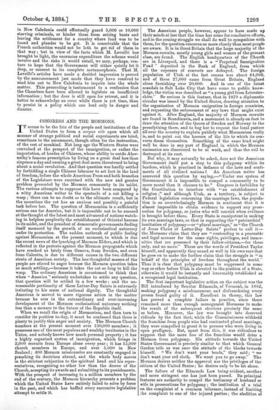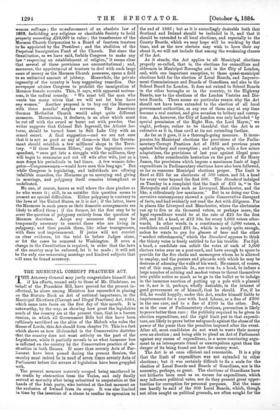CONGRESS AND THE MORMONS.
IT seems to be the fate of the people and institutions of the United States to form a corpus vile upon which all manner of strange political and social experiments are tried, sometimes to the amusement, though often for the instruction, of the rest of mankind. Not long ago the Western States were convulsed at the prospect of the immigration, or rather the importation, of hordes of Chinese, whose ability to outdo Aber- nethy's famous prescription by living on a great deal less than sixpence a day and earning a great deal more, threatened to bring about a social revolution. And that question was hardly settled by forbidding a single Chinese labourer to set foot in the land of freedom, before the whole American Press and both branches of the Legislature were exercised with the new and greater problem presented by the Mormon community in its midst. The various attempts to suppress this have been compared by a witty American writer to the spectacle of a cat killing a wasp ; there can be no doubt as to the ultimate result, but in the meantime the cat has an anxious and possibly a painful task before her. The question of Mormonism is a sufficiently serious one for America, but it is impossible not to be amused at the thought of the latest and most advanced of nations watch- ing in helpless perplexity the establishment of Oriental harems in its midst, and the proudest of democratic governments finding itself menaced by the growth of an ecclesiastical autocracy under its protection. The sudden outbreak of public feeling against Mormonism at the present moment, to which is due the recent news of the lynching of Mormon Elders, and which is reflected in the protests against the Mormon propaganda which have reached us lately from Geneva, from Sweden, and even from Calcutta, is due to different causes in the two different strata of American society. The less thoughtful masses of the people are stirred to anger because the Mormon question takes so much settling,—because it takes the cat so long to kill the wasp. The ordinary American is accustomed to think that when " America " seriously undertakes to settle any question, that question will be settled in a few weeks ; and the un- reasonable pertinacity of these Latter-Day Saints is extremely irritating to his sense of national dignity. The thoughtful American is moved to more vigorous action in the matter because he sees in the extraordinary and ever-increasing development of the Mormon ecclesiastical autocracy nothing less than a menace to the future of the Republic itself.
When we recall the origin of Mormonism, and then turn to consider its position to-day, it must be confessed that there is plenty to justify this anger and anxiety. The Mormon Church numbers at the present moment over 130,000 members ; it possesses one of the most populous and wealthy territories in the Union, and nobody knows how much personal property ; it has a highly organised system of immigration, which brings in 2,000 recruits from Europe alone every year ; it has 15,000 church members in Europe, and over 5,000 in New Zealand ; 400 Mormon missionaries are constantly engaged in preaching its doctrines abroad, and the whole body moves in the strictest subjection to the spiritual head and his repre- sentatives, recognising no other law than the decree of the Church, accepting its awards and submitting to its punishments. With the prospect of increasing to a million members by the end of the century, the Mormon hierarchy presents a problem which the United States have entirely failed to solve by force in the past, and which has baffled every successive legislative attempt to settle it. The American people, however, appear to have made up their minds at last that the time has come for conclusive efforts, and in the coming struggle we shall do well to sympathise with them, for the question concerns us more closely than most people are aware. It is in Great Britain that the large majority of the Mormon recruits, mostly young girls and women of the peasant class, are found. The English headquarters of the Church are in Liverpool, and there is a "Perpetual Immigration Fund " deposited in the Bank of England, from which all the expenses of converts are defrayed. The foreign population of Utah at the last census was about 44,000, and of these 27,000 came from Great Britain, England alone furnishing over 20,000. And in one of the latest scandals in Salt Lake City that have come to public know- ledge, the victim was described as "a young girl from Leicester- shire." So serious is this feature, that in 1879 a diplomatic circular was issued by the United States, drawing attention to the organisation of Mormon emigration in foreign countries, and requesting the enforcement of any laws that might exist against it. After England, the majority of Mormon recruits are found in Scandinavia, and a movement is already on foot to draw the attention of the Queen of Sweden and Norway to the proselytising there, and to beg her to request the local pastors all over the country to explain publicly what Mormonism really is, and to point out the horrors of the life to which its con- verts doom themselves. Something of the same kind might well be done in any part of England in which the Mormon emissaries are discovered to be at work, and thus the evil be destroyed at its root.
But why, it may naturally be asked, does not the American Government itself put a stop to this polygamy within its borders, which is practised in defiance of the laws and senti- ments of all civilised nations I An American writer has
answered this question by saying,—"Under our system of Government it is impossible to compel a community to be more moral than it chooses to be." Congress is forbidden by the Constitution to interfere with "an establishment of religion ;" and although Utah, as a territory, is subject to Federal legislation concerning the marriage laws, the popula- tion is so overwhelmingly Mormon in sentiment that it is almost impossible to obtain evidence to support any prose- cution for polygamy, or juries who will convict when evidence is brought before them. Every State is omnipotent in making its own marriage laws, so that in supporting the " patriarchial " institution of polygamy—or a plural marriage," as "the Church of Jesus Christ of Latter-Day Saints" prefers to call it — the Mormons claim that they are "contending in a peaceable and legal manner for the same rights, privileges, and immu- nities that are possessed by their fellow-citizens,--for these only, and no more." These are the words of President Taylor himself, and apparently they sound so well in his own ears that he goes on to make the further claim that the struggle is "in behalf of the principles of freedom throughout the world." Thus it is clear that polygamy must be suppressed in some way or other before Utah is elevated to the position of a State, otherwise it would be instantly and irrevocably established as a recognised legal institution.
The first important legislative action on the subject was the Bill introduced by Senator Edmunds, of Vermont, in 1882, making polygamy a misdemeanour, and disfranchising every person found guilty of it. Excellent in theory, this law has proved a complete failure in practice, since there remained more than enough monogamist Mormons to make the result of the subsequent elections precisely the same as before. Moreover, the law was brought into deserved ridicule by the fact that; while the Commissioners withheld the franchise from people who had contracted plural marriage, they were compelled to grant it to persons who were living in open profligacy. Bat, apart from this, it was ridiculous to suppose that the mere loss of the franchise would deter a Mormon from polygamy. His attitude towards the United States Government is precisely similar to that which General Gordon tells us was once the attitude of the blacks towards himself. "We don't want your beads," they said ; "we don't want your red cloth. We want you to go away." The Mormon desires neither the approval nor the privileges of the citizen of the United States ; he desires only to be let alone.
The failure of the Edmunds Law being evident, another and more stringent one has just been passed. Its principal. features are auth.ority to compel the testimony of husband or wife in prosecutions for polygamy ; the institution of a trial on the complaint of a common informer, instead of limiting the complaint to one of the injured parties ; the abolition of
woman suffrage ; the re-enforcement of an obsolete law of 136% forbidding any religions or charitable Society to hold property exceeding £10,000 in value; the transference of the Mormon Church Corporation to a Board of fourteen trustees to.he appointed by the President ; and the abolition of the Pcepetual Immigration Fund of the Church. But since the Constitution, as we have said, forbids Congress to make any law "respecting an establishment of religion," it seems clear that several of these provisions are unconstitutional ; and, moreover, the appointment of trustees to deal with such large sums of money as the Mormon Church possesses, opens a field to an unlimited amount of jobbery. Meanwhile, the private ingenuity of the country is busy suggesting remedies. One newspaper advises Congress to prohibit the immigration of • Mormon female recruits. This, it says, with apparent serious- ness, is the radical remedy. "We must tell the man who wants too many wives that we will not let him have any women." Another proposal is to buy out the Mormons with three months' surplus revenue. The American German Methodist Church would adopt quite different measures. Mormonism, it declares, is an ulcer which must be cut off with the sword or burnt out with powder. One writer suggests that Colonel Bob Ingersoll, the Atheist lec- turer, should be turned loose in Salt Lake City with an armed escort. A final suggestion—and we are not sure that it is not as good as any of them—is that the Govern- ment should establish a few milliners' shops in the Terri- tory. "If these Mormon Elders," says the ingenious corre- spondent, "once get into a struggle with the milliners, they will begin to economise and cut off wife after wife, just as a man drops his periodicals in bad times. A few woman dele- gates—Congresswomen—would have seen this long ago." But while Congress is legislating, and individuals are offering infallible remedies, the Mormons go on marrying and giving in marriage, and polygamy itself remains triumphant or undefeated.
No one, of course, knows so well where the shoe pinches as he who wears it ; still, to an outsider this question seems to present no special difficulties. Either polygamy is contrary to the laws of the United States, or it is not ; if the latter, leave the Mormons in such peace as their domestic arrangements are likely to afford them ; if the former, let the first step be to sever the question of polygamy entirely from the question of Mormon doctrines. Adopt any measures that may be temporarily necessary to convict those who are living in polygamy, and then punish them, like other transgressors, with fines and imprisonment. If juries will not convict on clear evidence, let the trial be before Judges alone, or 'let the cases be removed to Washington. If even a change in the Constitution is required, in order that the laws of the country may be enforced, let it be made ; it will not be the only one concerning marriage and kindred subjects that will soon be found necessary.















































 Previous page
Previous page